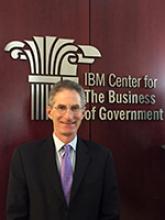Dan Chenok is Executive Director of the IBM Center for The Business of Government. He oversees all of the Center's activities in connecting research to practice to benefit government, and has written and spoken extensively around government technology, cybersecurity, privacy, regulation, budget, acquisition, and Presidential transitions. Mr. Chenok previously led consulting services for Public Sector Technology Strategy, working with IBM government, healthcare, and education clients.
Mr. Chenok serves in numerous industry leadership positions. He is a CIO SAGE and member of the Research Advisory Council with the Partnership for Public Service, Fellow of the National Academy of Public Administration, Member of the Board of Directors and Chair of the Policy Committee for the Senior Executives Association, Member of the Government Accountability Office Polaris Advisory Council for Science and Technology, and Member of the American University IT Executive Council. Previously, he served as Chair of the Industry Advisory Council (IAC) for the government-led American Council for Technology (ACT), Chair of the Cyber Subcommittee of the DHS Data Privacy and Integrity Advisory Committee, Chair of the NIST-sponsored Federal Information Security and Privacy Advisory Board, and an Adjunct Associate Professor with the U of Texas LBJ School of Public. He is also a three-time member of Cyber and Cloud Computing commissions with the Center for Strategic and International Studies. Mr. Chenok also generally advises public sector leaders on a wide range of management issues.
Before joining IBM, Mr. Chenok was a Senior Vice President for Civilian Operations with Pragmatics, and prior to that was a Vice President for Business Solutions and Offerings with SRA International.
As a career Government executive, Mr. Chenok served as Branch Chief for Information Policy and Technology with the Office of Management and Budget, where he led a staff with oversight of federal information and IT policy, including electronic government, computer security, privacy and IT budgeting. Prior to that, he served as Assistant Branch Chief and Desk Officer for Education, Labor, HHS, and related agencies in OMB's Office of Information and Regulatory Affairs. Mr. Chenok began his government service as an analyst with the Congressional Office of Technology Assessment, and left government service at the end of 2003.
In 2008, Mr. Chenok served on President Barack Obama’s transition team as the Government lead for the Technology, Innovation, and Government Reform group, and as a member of the OMB Agency Review Team.
Mr. Chenok has won numerous honors and awards, including a 2010 Federal 100 winner for his work on the presidential transition, the 2016 Eagle Award for Industry Executive of the Year, and the 2002 Federal CIO Council Azimuth Award for Government Executive of the Year.
Mr. Chenok earned a BA from Columbia University and a Master of Public Policy degree from Harvard's Kennedy School of Government.





